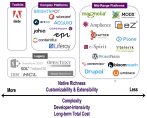FT.com bets on HTML5 in lieu of native apps
The esteemed Financial Times is ready to pull the plug on its iOS native apps and instead replace them with an HTML5-based app.
Reportedly, the so called "Apple Tax" -- whereby developers pay 30% of revenues to Apple -- along with lack of access to customer data, are the main reasons prompting FT.com to follow others (including Amazon who did the same thing with their Kindle app).
Many argue that the 30% revenue share for Apple is reasonable in exchange for providing a storefront and app store management. I agree with that, and suspect this tax may not be a big reason. In any case, without Apple's app store, developers will need to manage their own download facilities and storefronts (and spend money doing that). The 30% fee for repeat subscribers, though could be tougher to swallow.
A more important rationale for FT's move may lie in having no access to subscriber information -- something anathema to any publisher.
However, commercial considerations aside, there are more practical and technical reasons as well.
As we pointed out here and here, native apps have an edge over web apps for many scenarios when it comes to user experience and performance. However, native apps bring many challenges in a world of diverse device types and operating systems. The two dominant platforms -- iOS and Android -- themselves have many variations in terms of screen sizes and device capabilities. For example, the recently released "new iPad" may be the state of the art iOS device, but you will also need to support iPad 1 and iPad 2. On top of it, there are constant rumors of a different-sized iPad. The android-based device marketplace is even more fragmented. Now add Microsoft's Windows and RIM's Blackberry to the mix and you can easily see that having to develop and maintain native applications for all these is not a scalable proposition.
Having a standards-based (read: HTML5-based) app, either a web app or a hybrid app, will allow FT.com to target a much wider reader base with only an incremental effort required to support another device/OS variation in future.
To be sure, there are still advantages of native apps, but many of those are slowly getting eroded, at least for the most common scenarios such as news and content consumption. So if like many of our subscribers, you too are evaluating your mobile development strategies, do consider a web based app for your scenario and then decide whether you still need a native app. We explore this topic further in a recent advisory briefing.








